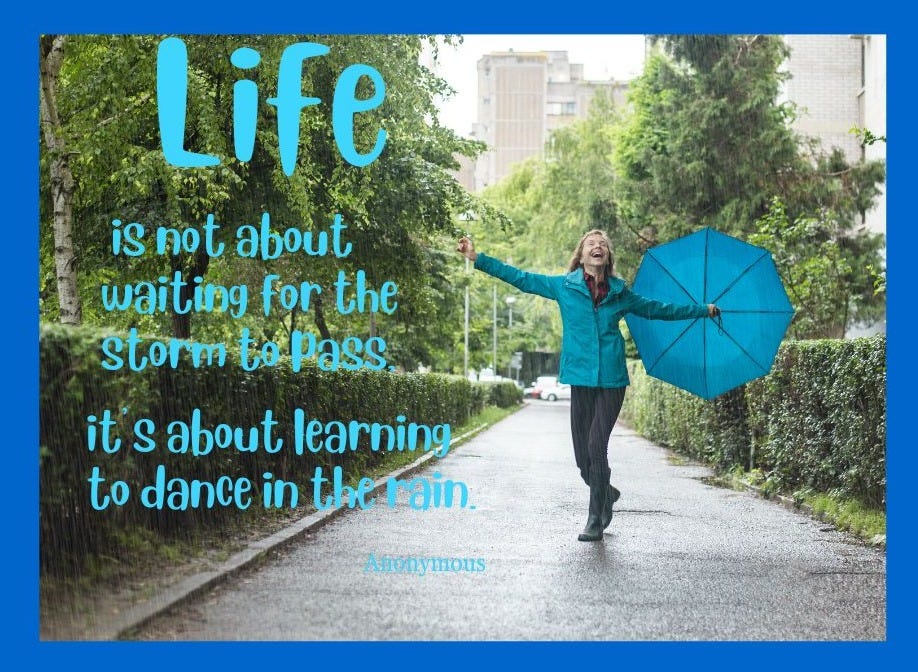What if life’s toughest challenges were actually building your strength? Every setback, heartbreak, and failure isn’t just something to endure—it’s shaping you into someone more resilient, more capable, and more prepared for the future.
By the time we reach our 50s, most of us have been thrown numerous curveballs—health challenges, betrayals, lost love, the death of someone we care about, career upheavals, etc. Life is unpredictable and at times incredibly difficult. Each of us handles these challenges in our own way, carrying forward lessons that shape how we face whatever comes next.
Resilience isn’t innate—it’s cultivated through life’s challenges and adversities. We can strengthen this vital quality at any stage of life, whether we’re young adults facing our first major setbacks or older adults drawing on decades of experience. In fact, research reveals that older individuals often demonstrate greater resilience than their younger counterparts, suggesting that this quality deepens with time and perspective.
So What Is Resilience?
The American Psychological Association defines resilience as “the process and outcome of successfully adapting to difficult or challenging life experiences, especially through mental, emotional, and behavioral flexibility and adjustment to external and internal demands.”
But what does that really mean?
Simply put, resilience is our ability to bounce back when life knocks us down. It’s not about avoiding hardship (if only we could!), but about developing the mental and emotional toolkit to navigate challenges effectively.
Here’s the good news: resilience isn’t something you’re born with or without—it’s a skill you can build. It doesn’t depend on wealth, status, or even perfect health. While genetics and upbringing play a role, research consistently shows that resilience can be strengthened at any stage of life. And that means no matter where you are right now, you have the power to become more resilient.
Can We Really Become More Resilient Later in Life?
Absolutely! Science confirms it. Thanks to neuroplasticity—our brain’s remarkable ability to reorganize and form new connections—we can continue developing new coping strategies well into our later years.
In fact, many older adults demonstrate impressive resilience precisely because of their life experiences. They’ve weathered storms before, and with each challenge they’ve gained hard-won wisdom about their ability to navigate difficult situations.
The Science Behind Resilience
The research on resilience is fascinating:
When it comes to older adults, studies consistently show that psychological resilience actually increases as we age. Remarkably, adults 85 and older often demonstrate equal or greater resilience capacity than their younger counterparts.
Even more compelling, another research study discovered that centenarians (those 100+ years old) exhibited the highest resilience levels among elderly populations. Those aged 94-98 with high resilience were 43.1% more likely to reach the century mark than peers with low resilience.
The decades-long Harvard Study of Adult Development reinforces these findings, revealing that strong relationships and emotional regulation are key factors in lifelong resilience. This landmark study emphasizes that quality relationships keep us happier and healthier by acting as “stress regulators” that help our bodies return to equilibrium after challenging events.
Barbara Fredrickson’s groundbreaking work adds yet another dimension. Her Broaden-and-Build Theory of Positive Emotions explains how positive emotions build long-term resilience by expanding our thinking patterns and enhancing adaptability. Positive emotions don’t just feel good—they actually broaden our thought-action repertoires, building our physical, intellectual, and social resources in ways that contribute significantly to resilience.
The takeaway is powerful: the adversities we accumulate throughout life aren’t just challenges to overcome—they’re opportunities that build our resilience, strengthen our confidence in facing difficulties, and ultimately improve our outcomes in later life. Far from wearing us down, our challenges can actually make us stronger!
Benefits of Resilience in Older Adulthood
Society often focuses on the challenges and declines that come with aging. But this narrow perspective misses something remarkable that many older adults possess in abundance: resilience.
How Resilience Transforms the Aging Experience
Resilience doesn’t just help us cope—it fundamentally shapes how we experience aging. Here’s how it can make a difference:
Navigating Life Transitions: Resilience provides the emotional toolkit to adapt to major changes like retirement, relocation, and shifts in family dynamics, helping them find purpose and meaning in new circumstances.
Managing Health Challenges: Resilient older adults demonstrate remarkable capacity to cope with chronic conditions, recover more quickly from medical setbacks, and maintain independence longer.
The Research-Backed Benefits
Research consistently shows that resilience in later life leads to tangible benefits, including:
Experience significantly improved quality of life and better mental health, contributing to what researchers call “successful aging” even in the face of adversity.
Report greater happiness, wellbeing, and life satisfaction compared to less resilient peers.
Demonstrate enhanced resistance to stress and significantly lower rates of depression.
Achieve better physical outcomes, including maintained independence in daily activities, increased longevity, reduced mortality risk, and faster cardiovascular recovery after stressful events.
It’s time we shift our cultural narrative about aging—moving away from images of inevitable frailty and decline toward a more accurate picture of resilience flourishing even within the context of vulnerability, illness, and loss.
This resilient capacity doesn’t diminish the real challenges of aging. Rather, it illuminates the remarkable human ability to adapt, find meaning, and continue growing throughout our lives.
Resilience and the Menopausal Journey
Resilience takes on particular significance for women in their 50s and beyond. The menopausal transition represents not just physical changes, but a profound life shift that can challenge identity, purpose, and emotional wellbeing.
Research suggests that women in this life stage who cultivate resilience demonstrate better adaptation to hormonal fluctuations, experience fewer depressive symptoms, and report higher quality of life scores.
While the physical aspects of menopause receive considerable attention, it’s often psychological resilience that proves most valuable in navigating the transition and in the decades that follow. Resilient women not only adjust better to menopause but also experience milder physical symptoms.
Many women discover that the postmenopausal years offer an unexpected opportunity to redefine priorities, pursue delayed dreams, and embrace new forms of self-expression. This period of reinvention—which has been referred to by some as the “second adulthood”—rewards resilience with the possibility of deeper fulfillment and purpose than in earlier life stages. Women who approach this transition with flexibility, optimism, and self-compassion often report that their sixth decade and beyond brings a liberating sense of confidence and authenticity previously unavailable to them.
My Personal Resilience Role Model
Resilience isn’t just learned from books or studies—it’s modeled in real life. My greatest resilience role model has always been my Mom.
She faced some of life’s most difficult challenges with unwavering strength, grace, determination, and even occasional humor. Seeing her remain strong in the face of uncertainty taught me valuable lessons about perseverance, optimism, and self-reliance and gave me a blueprint for handling my own struggles.
The resilience she modeled continues to inspire me daily, and I hope sharing these insights honors her legacy in some small way.
Practical Ways To Build Resilience
Based on both research and personal experience, here are my favorite strategies for strengthening resilience:
Embrace a growth mindset: A growth mindset is the belief that abilities and intelligence can be developed over time. When a person has a growth mindset, they tend to see all experiences—positive and negative—as learning opportunities. Rather than view a setback as a failure, they’ll receive it as information to make their path forward more productive. When facing challenges, remind yourself: "This is difficult, but I'm learning and growing through it."
Maintain Strong Relationships and Social Support: Strong connections provide emotional support when times get tough. Who are the people you can truly count on? Regularly schedule family dinners or outings with friends to foster and maintain these vital connections. Joining social groups or online communities with similar interests can help build and strengthen your network.
Practice self-compassion: Talk to yourself as you would a good friend—with kindness and understanding, not harsh criticism. In psychology, self-compassion is extending compassion to one's self in instances of perceived inadequacy, failure, or general suffering. American psychologist Kristin Neff has defined self-compassion as being composed of three main elements—self-kindness, common humanity, and mindfulness.
Practice mindfulness and meditation: Regular mindfulness practice—even just five minutes daily—can dramatically improve your ability to manage stress.
Prioritize physical well-being: Exercise, nutrition, and sleep form the foundation of mental resilience. Even a daily walk can work wonders.
Find your purpose: Connecting to something larger than yourself provides perspective during difficult times. Volunteering for a cause you’re passionate about can be an excellent way to find purpose.
Reframe negative thoughts: Instead of “Why is this happening to me?,” try “What can I learn from this situation?”
Take small, concrete actions: Set small achievable goals to eliminate feelings of overwhelm. Even tiny steps forward can break the paralysis that often accompanies challenging situations.
Never stop learning: Tackling new challenges builds confidence in your ability to handle the unexpected.
Find moments of joy and humor: Laughter truly can be medicine during difficult times.
The Continuous Journey of Resilience
The path to resilience isn’t linear or finished at any particular age. Rather, it’s a continuous journey of growth that evolves as we do. The research is clear: our capacity for bouncing back strengthens with experience and intentional practice.
What makes this journey so remarkable isn’t just surviving difficulties—it’s how we transform through them. Each challenge we weather adds another layer to our resilience foundation, giving us greater wisdom to face whatever comes next.
For women navigating midlife transitions, for anyone confronting unexpected setbacks, and for those reimagining what their later years might hold—resilience offers not just survival, but the possibility of emerging stronger, more authentic, and more connected to what truly matters.
By cultivating resilience—through small daily practices and life’s biggest challenges—we don’t just endure; we evolve, discovering strengths we never imagined.
In loving memory of my Mom (1925-2018), whose strength and resilience continue to inspire me daily. As we mark what would have been her 100th birthday, I dedicate these words to her enduring spirit.
What’s one resilience lesson that’s impacted your life’s journey? Leave a comment below to share your story of resilience.
Want to dive deeper into how physical resilience can be a game-changer? Check out this post:







Much needed, well-researched and beautifully expressed words of encouragement and wisdom to help get us through adversity, past, present and future. Thank you Daria.
This is such a tough subject. My mother always admired my resiliency. Truth of the matter is that I felt like an imposter. I was always quaking in my boots. I managed to get through "stuff" but never felt stronger on the other side of it.
My mother was my champion. Thankfully I kept notes of encouragement she wrote me. So today when "stuff" comes up I read the notes and remember her words, she had faith in me when I didn't have it in myself. Now I stand on my own two feet, resilience has been present long enough so that now I no longer feel like an imposter. Good article, thank you.